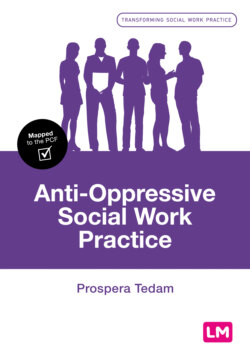Читать книгу Anti-Oppressive Social Work Practice - Prospera Tedam - Страница 34
На сайте Литреса книга снята с продажи.
Why is diversity important?
ОглавлениеEverywhere on this earth we find a condition of separateness among groups. People mate with their own kind. They eat, play, reside in homogenous clusters. They visit with their own kind and prefer to worship together. Much of this automatic cohesion is due to no more than convenience. There is no need to turn to out-groups for companionship. With plenty of people at hand to choose from, why create for ourselves the trouble of adjusting to new languages, new food, or to people of a different educational level? It requires less effort to deal with people who have similar presuppositions.
(Allport, 1954, p17)
In 1954, Allport would most certainly have been applauded for stating openly what perhaps the majority of people felt and believed at that time. In 2020, there is evidence that this view is still rife, however, with perhaps fewer people owning up to such thoughts because of public opinion and for fear of being exposed. The statement plays into the hands of people who support reduced cultural and ethnic diversity. As social workers, it may sometimes be obvious to us why diversity is important in the work we do; however, with recent global and national events, it is no longer safe to make such assumptions. Diversity is not a side issue to be addressed occasionally, nor is it one to be left to a few people in a team or organisation. It is something that applies to everyone and should be part of everything we do in practice. Neither we, as social workers, nor the people who use social care services fit into neat and distinct categories; consequently, we see the world from very different perspectives. In order to work effectively in a diverse setting, we need to understand ourselves, recognise our biases and work constructively to overcome them.
Social Work England (SWE) (2020) has identified in their Qualifying and Training Standards (4.3) the need to ensure that the course is designed in accordance with equality, diversity and inclusion principles, and human rights and legislative frameworks. This standard demonstrates further the importance of embedding equality and diversity principles from the outset in a trainee social worker’s journey while they are in training and well into practice.
In addition, diversity is important because it is one of the nine overarching competences for social workers in the Professional Capabilities Framework for Social Workers in England. According to Parker and Crabtree (2018), the social work profession is preparing its practitioners to serve those who experience discrimination, marginalisation and oppression, and many of these service users will experience this discrimination and oppression on the grounds of many of the areas of diversity.
Social work students prepare to work in a variety of professional arenas and these diverse areas also require diverse skills, knowledge and expertise. Direct work with service users, policy development, management and research are some of these areas. There is a growing need for social work services for persons who have experienced natural or manmade disasters, from victims and survivors of bush fires (Australia), earthquakes (Haiti), hurricanes (USA) to survivors of mass shootings and terrorism (USA, New Zealand) and disasters such as the Grenfell Tower fire (UK). In relation to the Grenfell Tower tragedy in London, Ferguson and Lavalette (2017) suggest that while the building was located in the richest borough in the UK and one of the richest in the EU, the safety of residents appeared not be high on the agenda, as authorities ignored multiple warnings about the quality of material used during the refurbishment of the tower block. The question of class diversity is examined with an overwhelming suggestion that some lives appear to be more important than others. Social workers were called upon to work with survivors and their families, restoring homes and providing appropriate interventions. While reflecting on this, it is important to imagine the extent of diversity manifested in the nature of the families, the expressions of grief and resilience, as well as the varied coping strategies used by the survivors and their families. Working effectively across these differences using the appropriate affective (moods and feelings), cognitive and behavioural skills are required of social workers across the many different areas of practice.
